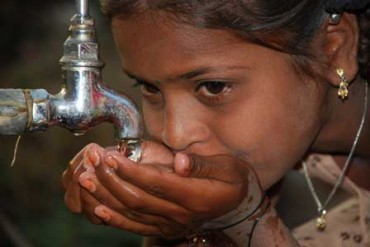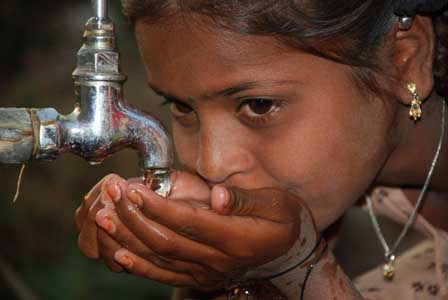Via Activist Post
 DAVOS-KLOSTERS, SWITZERLAND ? This January 26th, the water industry will privately review its newest strategy for driving public water resources into private hands at the World Economic Forum. A partnership quietly launched in October with funding from the World Bank, Coca-Cola and Veolia will report on progress towards its stated mission to ?transform the water sector? by establishing ?new normative approaches to water governance? that put the private sector in the driver?s seat in water management.
DAVOS-KLOSTERS, SWITZERLAND ? This January 26th, the water industry will privately review its newest strategy for driving public water resources into private hands at the World Economic Forum. A partnership quietly launched in October with funding from the World Bank, Coca-Cola and Veolia will report on progress towards its stated mission to ?transform the water sector? by establishing ?new normative approaches to water governance? that put the private sector in the driver?s seat in water management.
Calling itself the Water Resources Group (WRG) and headed by Nestlé Chairman Peter Brabeck-Letmathei, the corporation has already targeted the countries of Mexico, Jordan, India and South Africa to ?shape and test governance processes? that would make water privatization more feasible and profitable. The fact that the Group has not invited publicity, and the Bank was unwilling to comment upon its launch, underscores how controversial its founders know the endeavor to be.
?The cognitive dissonance could not be clearer,? said Corporate Accountability International Executive Director Kelle Louaillier. ?Amid a global water crisis, exacerbated by one failed privatization scheme after another, a development institution is aggressively advancing narrow industry interests to the detriment of poverty alleviation.?
Corporate Accountability International and its allies see the WRG as an outgrowth of longstanding Bank ideology and financing practices. For close to three decades the Bank?s corporate investment arm, the International Finance Corporation (IFC), where the Group is now housed, has sponsored the global drive to privatize water resources, attracting billions of dollars in additional financing from private banks.
This despite the fact that the World Bank reports 34 percent of such IFC-sanctioned water contracts are in distress or terminated before maturity ? by far the highest rate of failure of any of the infrastructure sectors the Bank lends to. What?s more, in April the IFC?s Compliance Advisor Ombudsman reported that 40 percent of all complaints received across all IFC-financed sectors were water-related.
Still the Bank continues to act as a primary agent of water privatization. The Bank has demonstrated a long-term ideological commitment to promoting corporate control of public services and assets in the categorical belief that such privatization will lead to greater efficiency. In addition, the Bank has a more direct interest in expanding the private water market. As an equity investor in transnational water corporations, the Bank’s own profits are tied to the financial success of its private sector clients — who anticipate windfall profits from controlling water services and products. The Bank’s own financial investments in the world’s leading water privateers create a fundamental conflict of interest, giving corporate interests undue primacy in Bank decisions, and giving a self-serving aspect to its work with governments, where the same institution continues to charge hefty fees for advising and arranging deals that benefit its own portfolio of corporations.
Critics like independent urban water expert Vinay Baindur describe this new alignment between the World Bank, the government and the private sector as “a tripartite partnership to expand the stake for profits.”
For targeted nations and others to receive support from the WRG, projects must ?provide for at least one partner from the private sector as part of its operations.? Such conditionalities have long been attached to Bank loans, dictating to countries an approach to water management often at odds with a basic democratic interest in guaranteeing water as a human right to all its citizens.
Corporate Accountability International identified this development shone a public spotlight on the very secretive initiative. The organization runs a campaign challenging corporate control of water, and is calling on the IFC to divest from water, including ceasing support of endeavors like the WRG.




